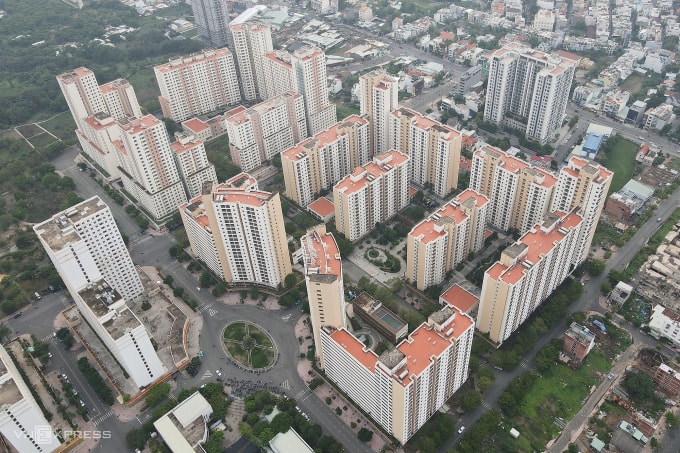The situation of excess high-priced houses, lack of affordable houses, thousands of abandoned houses, waste, and reluctance to borrow to buy real estate despite low interest rates is expected to last until 2025.

Last year marked the recovery of the real estate market since the "bottom" recorded in 2023. However, many challenges that appeared in the previous period are forecast by many experts to continue in 2025, requiring sustainable solutions to overcome difficulties for the housing market.
Too many high-priced houses, not enough affordable goods
According to a report by OneHousing - a real estate service unit backed by Masterise Homes and Techcombak - new apartments for sale in Hanoi reached about 30,000 units this year, of which 70% were high-end apartments and the rest were luxury apartments.
In Ho Chi Minh City, the new supply in 2025 is expected to reach 12,000 units, of which the expensive type accounts for 88%. "Expensive apartments may still dominate the apartment market in Hanoi and Ho Chi Minh City this year," said Mr. Tran Quang Trung, Director of Business Development at OneHousing. The supply of mid-range apartments has almost disappeared in the two largest cities in the country.
The paradox has actually lasted for many years. The situation of expensive apartments dominating the real estate market has forced the Ministry of Construction to raise the price range for this segment by 28-44%. Specifically, apartments priced under 45 million VND per square meter belong to the affordable segment, previously under 25 million VND per square meter. Meanwhile, luxury apartments are around 70-100 million VND per square meter, up from over 50 million VND previously.
However, the structure of new apartment supply still tends to be clearly out of phase. The Ministry of Construction said that affordable housing accounted for only 5-7% of the total new supply last year, while the high-end segment accounted for 60-65%. Mid-range apartments priced at VND45-70 million accounted for about 30-35% of the market share. Last year, the market recorded the appearance of several super luxury projects, with prices exceeding VND100 million per square meter.
Mr. Nguyen Van Dinh, Chairman of the Vietnam Association of Realtors (VARS), said that the high-end segment of the market is mainly "for investors with a lot of money". Meanwhile, affordable housing, which should be the most popular, is "extinct" with no new projects.
In the long term, according to the Chairman of VARS, if this paradox is not intervened early, it will lead to many consequences for the market and society.
Waste of abandoned resettlement houses
Over the past decade, major cities in Vietnam have witnessed rapid urbanization, leading to a sharp increase in housing demand. In the coming time, demand for housing segments is forecast to continue to increase. The Ministry of Construction said that the urban population ratio could increase from the current 40% to about 45% by 2030. With this rate of population growth and housing demand, the market needs about 70 million square meters of urban housing each year.
Large cities such as Hanoi and Ho Chi Minh City, where population is high, require a faster increase in urban housing area. However, these two cities have the paradox of abandoning tens of thousands of resettlement houses, causing waste despite the huge housing demand of the people.
In Hanoi, the city said there are 174 resettlement areas in use with more than 14,200 apartments. The number of abandoned resettlement apartments is about 4,000. Many projects have residents living there, but the service business area has also been left empty for many years, with no units renting or using them.
In Ho Chi Minh City, according to statistics from the Department of Construction, nearly 9,000 resettlement apartments are empty. Of these, over 5,300 apartments in the Binh Khanh resettlement area (Thu Duc City) are uninhabited. The Vinh Loc B project (Binh Chanh District) with over 2,000 apartments is also abandoned.

Mr. Le Hoang Chau, Chairman of Real Estate AssociationHo Chi Minh City Real Estate Association (HoREA) believes that it is unreasonable for tens of thousands of apartments to be abandoned while many people still do not have a home.
Since 2018, the supply of housing, especially the apartment segment, has decreased significantly. According to Mr. Chau, the number of approved projects is increasingly small, while the number of projects under implementation is also struggling due to legal and capital problems.
Therefore, the Chairman of HoREA believes that the situation of abandoned resettlement houses needs to be resolved promptly to awaken this type of housing, contributing to improving supply and effectively exploiting land resources.
Afraid to borrow money to buy a house even though interest rates are at rock bottom
Since the beginning of last year, many banks have simultaneously lowered their home loan interest rates. Real estate loan interest rates for individual customers remain at 5.5-8.5% per year, depending on the promotional period and each bank. Existing customers enjoy floating interest rates of 11-13% at private banks.
The State Bank said that lending interest rates in 2024 will decrease by about 0.96% compared to the end of 2023. In general, last year, the lending interest rate level (production, consumption...) decreased by 2.5% per year.
Although interest rates have hit rock bottom, demand for home loans remains sluggish.
Dr. Can Van Luc, chief economist of BIDV Bank, also believes that interest rates are not the reason why people are reluctant to borrow to buy houses. Because by the end of 2024, home loan interest rates at many banks have decreased by 1-3% compared to the same period.
The main reason, according to Mr. Luc, is that housing prices are still very high, despite many investors launching stimulus and incentive policies. While people's jobs and incomes are still very difficult, they are "afraid to borrow a large amount of money to own a house".
This year, the supply of housing is more abundant but only focuses on the high-end segment, which may prolong the fear of borrowing to buy a house. "People see that housing prices are too high, so they have to delay and wait for the market to have affordable products," Mr. Luc commented.
VN (according to VnExpress)